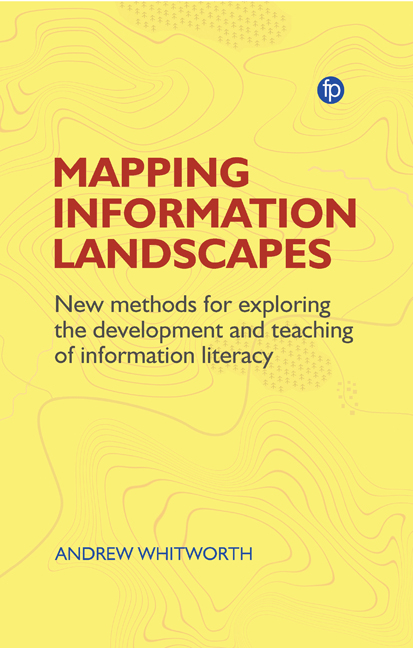 Mapping Information Landscapes
Mapping Information Landscapes Book contents
5 - Maps of Cognition
Published online by Cambridge University Press: 23 July 2020
Summary
Introduction
So far I have discussed mapping as both a graphic and discursive practice, but the case studies used have been mostly concerned with the mapping and navigation of geographical space. While I hope I have already shown that all mapping is a mapping of information as well as geographical landscapes, what I focus on in this chapter are mappings that, on the surface, have no relation to physical geography: the concept or mind map.
This chapter brings in the notion that the mapping techniques explored so far can be applied to informational space, at least at some level and without losing basic principles: such as maps’ boundedness and materiality, the social nature of the mapping process and maps as a reification of agreements made at particular places and times. Through discussing several prior research studies, I investigate how concept mapping has been used in two principal ways vis-à-vis information literacy: first, the generation of data regarding research subjects’ information horizons and landscapes; second, as teaching tools to raise learners’ awareness of resources and pathways within a landscape.
The educational interventions discussed here are not necessarily exemplars. I agree with Jane Secker (in her foreword to Forster, 2017): given that IL interventions must always be customised to (and within) the context, I should be wary of generalising from these cases and concluding that they will be applicable in different, or all, contexts. Rather, the aim is to use these case studies to ask what we can learn from them vis-à-vis mapping specifically and the development of IL practice more broadly. There are lessons to be learned about not just how these prior studies engaged participants with creating a map (graphical or discursive), but what participants learned about mapping as a practice; how their maps were talked into being, via a discursive and/or dialogic process; and social aspects of mapping, affect and power.
Non-geographical maps
First, though, it is necessary to establish that maps do not have to be geographical. Consider the organisation chart in Figure 5.1: this is an imaginary organisation but it is a prevalent and familiar type of image.
- Type
- Chapter
- Information
- Mapping Information LandscapesNew Methods for Exploring the Development and Teaching of Information Literacy, pp. 87 - 132Publisher: FacetPrint publication year: 2020


